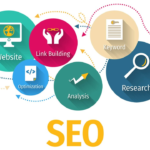Optimizing meta tags, headings, and meta descriptions can help improve your website’s search engine ranking by providing search engines with relevant information about your content. Here are some tips to help optimize these elements:
Meta Title: This tag is the title of your web page and is displayed as the headline in search results. It should be descriptive, concise, and include your primary keywords. Keep it under 60 characters to avoid getting truncated.
Meta Description: This tag provides a brief summary of your web page’s content and appears underneath the title in search results. It should be persuasive, include your primary keywords, and be under 160 characters.
Heading Tags: Use headings (H1, H2, H3) to structure your content and make it easier to read. Your primary keyword should be included in the H1 tag, and the H2 tag can include secondary keywords.
Keyword Optimization: Use your primary keyword in the title, meta description, and H1 tag. Don’t stuff your content with keywords as it can negatively affect your ranking.
Content Quality: Ensure that your content is high-quality, relevant, and useful to your audience. Search engines prioritize content that provides value to users.
User Experience: Improve user experience by making your website easy to navigate, fast loading, mobile-friendly, and accessible.
Schema Markup: Schema markup can help search engines understand your content and display rich snippets in search results, which can increase click-through rates.
By following these optimization tips, you can improve your website’s search engine ranking and attract more traffic to your website. However, keep in mind that it takes time and effort to see results, and you should focus on providing value to your users rather than solely on improving your search engine ranking.















